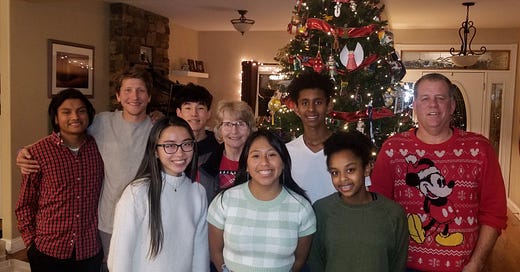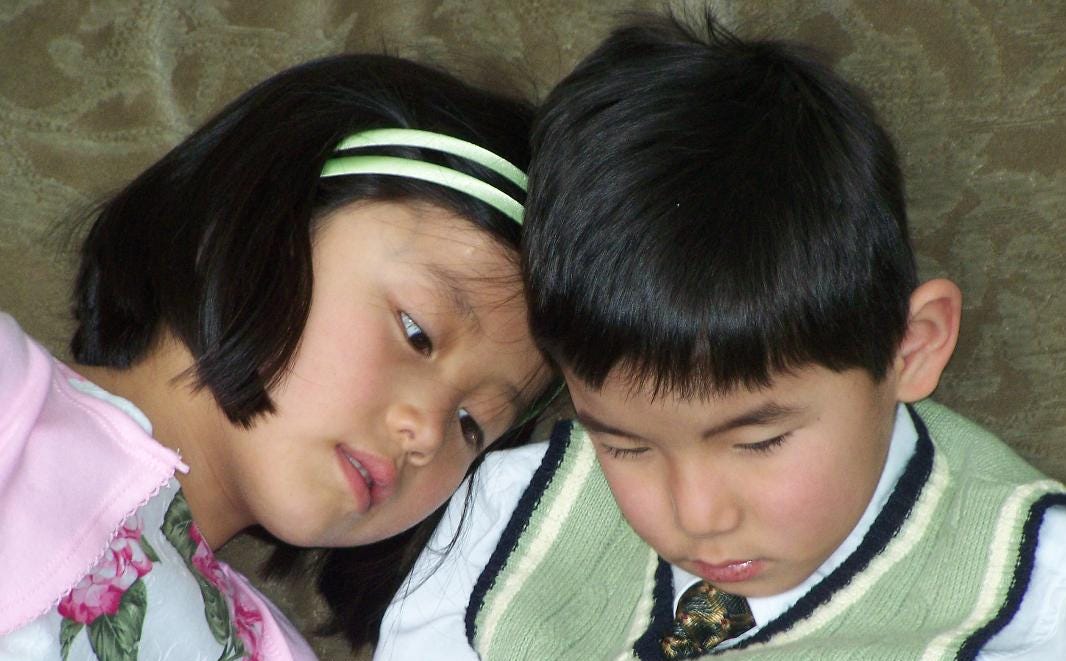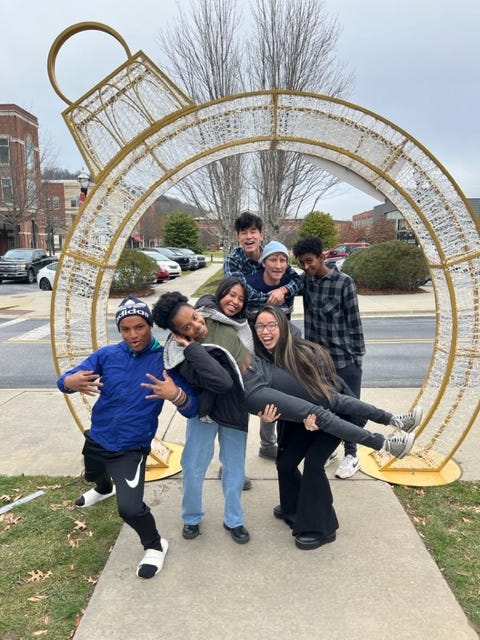A Global Family Comes Home for the Holidays
Rik and Kris Emaus share very American holiday traditions with their children from five different countries. They talked about the joys and challenges of international adoption.

BREVARD — On a trip to Siberia to adopt their now 20-year-old son, Yuri, Kris and Rik Emaus toured orphanages packed with hundreds of babies and “a somewhat ramshackle” dacha deep in the woods.
The orphans there were older, their chances for finding a family slipping away or, probably, long gone.
“They were so desperate they literally climbed on you. They came to you and hugged you and called you ‘Mama’ and ‘Papa,’ ” Rik Emaus said. “It just hurts your heart to see the kids who aren’t adopted.”
“There were so many kids,” Kris Emaus said, “To me, you just couldn’t unsee it.”
It was then that they decided to save as many children as they could from such loneliness and deprivation. They traveled the world over the next several years, taking in five more children from China, Guatemala and Ethiopia, and rearing them all with Jacob Hammerberg, now 31, Kris Emaus’ son from an earlier relationship.
They laid out tens of thousands of dollars for adoption services and travel expenses. They navigated the rocky cultural and ethical terrain of well-to-do Americans adopting babies from poor families in distant countries.
They took on the duties of changing diapers and driving kids to school and sports practices. They have started putting their older adoptive children, Yuri and Jia, who is also 20, through college.
They have given their children love, health, comfort and opportunity. They are convinced they did a good thing.
But they also got just what they wanted.
Kris Emaus, 62, and Rik Emaus, 64, were in their 40s when they married. Neither pregnancy nor domestic adoption worked out for them. They flew to Siberia for “selfish” reasons, she said.
“We didn’t approach this as, ‘We’re going to save the world,’ that’s not who we are,” her husband said. “We approached this with the idea that we love kids and we want to have a family together.”
Hammerberg had flown in from Colorado last week as they talked at their house in Brevard. Yuri and Jia were home on winter break.
Though the Emaus children adopted from foreign countries harbor varying degrees of curiosity about their home cultures, they all embrace American holiday traditions. And maybe, if these celebrations are really about family, they embody them.
Some of the children gathered around a kitchen counter to share memories and old photos while carols played softly from a Bluetooth speaker. Others helped decorate a nearby Christmas tree.
“It’s the right family,” Rik Emaus said as he looked on. “It’s the perfect family. It’s the family we were supposed to have.”
The Quest Begins
For all the Emaus children’s far-flung origins, the prevailing culture of their household could be described, in the best sense of the phrase, as “Wisconsin nice.”
Nobody was offended by questions about privilege and politics. The children spoke politely and openly about their biological families, and their parents about the origins of their adoptive one.
It started in Oshkosh, Wis., north of Milwaukee. Rik Emaus, who wanted children, was ending a nearly 10-year-marriage to a wife who didn’t. He volunteered with Big Brothers Big Sisters of America, and was matched with Hammerberg.
“I was Jake’s big,” he said.
This relationship gave him nearly a year to witness Kris Emaus’ devotion to her son and father, who suffered from dementia. She got to see Rik Emaus, a family and sports medicine doctor, bond with her son, whom he would later adopt.
“I could tell he would be a wonderful father,” she said.
They went on their first date, to a Milwaukee Bucks’ basketball game, on a Sunday. When Rik Emaus called the following Tuesday, his wife remembered, “I said, ‘You want to get married or what?’ ”
“I kind of said, ‘Okay,’ ” he said.
They tried, without success, to have children after Kris Emaus underwent a procedure to reverse her earlier tubal ligation. They were put off by one requirement of adoption in Wisconsin, that they share parental duties with biological parents. Also, it seemed, they were just too old.
Domestic adoption is “all birth-parent driven,” and the often very-young mothers get to choose the prospective parents, Kris Emaus said.
“To a 16-year-old girl, 40 is ancient.”
Which brought them to the shores of Siberia’s Lake Baikal and to Yuri, who had not only been born prematurely, but in a misguided attempt to protect him from illness, Rik Emaus said, “was wrapped in so many layers, he couldn’t move.”
At 11 months, an age when some babies are learning to walk, Yuri could only roll over. “He was very delayed,” Kris Emaus said.
Back in Wisconsin and freed of his swaddling, Yuri started catching up quickly, cruising around the home in a distinctive, kneeless, hands-and-feet crawl. He is now a marketing major at Western Carolina University in Cullowhee.
His prospects of adoption in his home country were likely “under fifty-fifty,” Rik Emaus said, while Jia’s “were probably less than 5 percent.”
She had been dropped off anonymously at a hospital in a city in central China. A birthmark on her lower back was an indicator of spina bifida, which carries the risk of stunted growth or even paralysis of her lower body.
After returning to Wisconsin with her adoptive parents, she received an additional operation and continued monitoring from a pediatrician who would later pass on a message that Rik Emaus can still quote verbatim:
“ ‘I’ve got one word for you — normal.’ ”
Jia went on to star as a student and competitive swimmer, who also earned a black belt in Taekwondo. She’s studying languages and foreign affairs at the University of North Carolina Greensboro.
Speaking of her and Yuri, Rik Emaus said, “I have a high level of confidence that we have been able to give them a better start in life and better chances overall without having to think twice about it.”
Navigating Adoption
The Emauses would like to think the same is true of children they adopted from Guatemala and Ethiopia, Kris Emaus said, but because adoptions in those countries were controlled by private agencies “in reality you can never know.”
The number of international adoptions has plunged since its peak in 2005 mostly due to changing policies in countries of origin. A diplomatic dispute caused Russia to ban adoptions to Americans starting in 2013, and in 2015 China ended its one-child population-control policy, greatly reducing the rolls of adoptable children.
The Ethiopian and Guatemalan governments, meanwhile, have cracked down on adoption agencies due to reports that corrupt practices essentially allowed parents from wealthy countries to buy babies.
“I struggle a little bit more with adoptions from Ethiopia and Guatemala just because of the sketchiness of some of the adoptive processes there,” Rik Emaus said.
The Emauses did what they could to ensure that the children they adopted from, for example, Guatemala, were given up voluntarily.
Victor, 17, was born to a 14-year-old mother and his father had been barred from the home after inflicting some unspecified trauma.
“Something cataclysmic, something very difficult, happened in that home,” Rik Emaus said.
Isa, 15, was the youngest child born to a large family whose children had been fathered by a different man. Her mother, a cleaner at a hotel in Guatemala City, gave her up, Rik Emaus said, because the family “just could not feed one more mouth.”
But the information they have is the information passed on by agencies. And, he said, it’s likely that any challenges their children faced could have been overcome by money.
“It’s not comfortable to acknowledge that they might have stayed with their families if not for abject poverty,” he said, “and that just really sucks.”
Defining Home
Another way the Emauses try to address uncertainty about their children’s origins: providing them with full access to their adoption files and the option of reaching out when the time is right.
Kia, 14, is happy where she is, has no intention of visiting Ethiopia or learning its prevailing language, Amharic.
“That’s too much work,” she joked, as her siblings laughed.
Isa, 15, opened her phone to display a picture of her birth mother, whose copper-colored skin and high cheekbones are the mirror of her own. Isa knows her mother’s name, as well as those of her Guatemalan siblings and grandmother, she said.
“Knowing they could still be there, knowing I look so much like my mom,” she said, makes her want to look them up and to explore the country of her birth. So do the experiences of Hispanic friends immersed in their home cultures.
“I’ve always been interested in my heritage,” she said.
Jia, meanwhile, has only an artist’s rendering, based on her own features, of what her mother might look like, and the mystery surrounding her birth helped spark an interest in global cultures that has shaped her life.
It’s also been driven by her layered feelings about her adoptive family, which on one hand has provided a model for the blending of diversity — and, on the other, has left her with a nagging sense of displacement common even among foreign-born children adopted by caring parents.
Jia is grateful for their love and for the medical treatment they provided, she said. But she can also see that she looks different than her parents and most of her siblings. She faces stereotypes that they don’t. She is perceived differently by the outside world.
“Obviously, I have everyone else (in the family), but sometimes it makes me feel like, ‘Oh, I don’t have anyone blood-related,’ ” she said. “And I’m kind of alone in those circumstances.”
After a year attending high school in Ecuador, she is fluent in Spanish. She is learning Mandarin in college and hopes to visit China, maybe on an internship with the U.S. State Department.
She plans a career promoting greater understanding among cultures, advancing a vision of “a world where we don’t focus on differences,” she said, where “we focus on living together even though we have differences.”
The Joy of a Blended Family
Kris and Rik Emaus intended to do more cultural exploration of their own.
“We had high hopes before we brought them all home,” Kris Emaus said. “We thought, ‘Oh, when they’re older, we're going to take them on a trip and let them all see their homeland and we’ll learn the languages.’ ”
They abandoned this plan as the number of children and countries of origin kept growing, along with the work required to raise them.
At one point when both parents were in their 50s, four of their children were either in potty training or diapers.
“Changing diapers is an endurance sport best left to younger people,” Rik Emaus said.
Such burdens mostly fell on Kris Emaus, a stay-at-home mom — both in Wisconsin and, later, in Olympia, Wash., where Rik Emaus ran a large integrated medical practice.
To take on a greater share of these duties, Rik Emaus took early retirement and in 2017 the family moved to Brevard, where he also threw himself into community work, notably helping to found the TC Strong initiative to promote youth mental health.
But they traveled enough, saw enough, that expanding their family expanded their view of the world.
They visited landmarks. Rik and Kris Emaus walked the Great Wall of China and he and Hammerberg hiked the Mayan ruins of Tikal, in Guatemala.
But they also saw the orphanages in Siberia, shared a six-course meal with the mayor of a town near Lake Baikal, and watched as crowds formed in Jia’s home city as they walked her in a stroller. When the Emauses held up a sign informing residents of her adoption, Kris Emaus said, “they smiled and clapped and were incredibly warm.”
“We lived with the locals” on adoption trips, she said. “We saw the actual lives of the people.”
To care for children from the places they remember so fondly gives them a satisfaction they could never have imagined when they decided to forgo expensive pregnancy procedures and commit to taking in kids from around the world.
When the children all gather for the holidays, when “we’re all looking at all the memories, when we’re thinking about how we all came together, the specialness of this family really hits me,” Rik Emaus said.
“I just feel overwhelming gratitude.”
Editor’s Note: I’ll be taking a few days off to help my older son get settled in a new job in Louisiana, but plan to publish my annual update on the housing market and new home construction late next week. Feel free to reach out with thoughts. Meanwhile, here’s the latest from Asheville Watchdog on plunging enrollment at the University of North Carolina Asheville.
Email: brevardnewsbeat@gmail.com







Dan — This is a fabulous story!